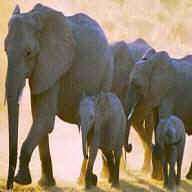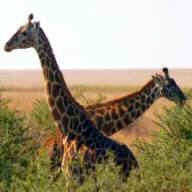|
----------------------------------------------------------------------------------------
Location:
East
Africa
Independence:
December 12, 1963
Capital
City: Nairobi
Population:
28,817,227
Important
Cities: Mombassa,
Kisumu, Nakuru
Head
of State: Daniel
Arap Moi
Area:
582,488 sq.km.
Type
of Government: Republic
Currency:
29.37 shillings=1 USD
Major
peoples: Kikuyu,Maasai,Luhya,Luo,Kalenjin,Kamba
Religion:
Protestant 38%, African religion
28%, Catholic 28%, Muslim 6%
Climate:
Tropical to arid
Literacy:
71%
Official
Language: English
Principal
Languages: Kikuyu,
Maasai, Kamba, Luo
Major
Exports: Tea,
Coffee
Pre-Colonial
History: Fossils
found in east Africa suggest that proto-humans
roamed the area more than 20 million years ago.
Recent finds near Kenya's Lake Turkana indicate
that the "Homo" genus of humans lived
there 2.6 million years ago. Cushitic-speaking
people, who occupied the area from about 1000
B.C., traded with Arab merchants by the first
century A.D. Kenya's proximity to the Arabian
Peninsula invited colonization, and Arab and
Persian settlements were established along the
coast by the 8th century A.D. By then, Bantu and
Nilotic peoples had moved into the area. Arab
dominance was eclipsed by the arrival in 1498 of
the Portuguese, who gave way in turn to Islamic
control under the Imam of Oman in the 1600s.
Britain established its influence in the 19th
century. The colonial history of Kenya dates
from the Berlin Conference of 1885, when the
European powers first partitioned east Africa
into spheres of influence. In 1895, the British
Government established the East African
Protectorate and, soon after, opened the fertile
highlands to white settlers. In 1920, Kenya
officially became a British colony. From October
1952 to December 1959, Kenya was under a state
of emergency arising from the Mau Mau rebellion
against British
colonial rule.
Post-Colonial
History: Kenya
became independent on December 12, 1963, and the
next year joined the Commonwealth. Jomo Kenyatta,
a member of the predominant Kikuyu tribe and
head of the Kenya African National Union (KANU),
became Kenya's first president. The minority
party, Kenya African Democratic Union (KADU),
representing a coalition of small tribes that
had feared dominance by larger ones, dissolved
itself voluntarily in 1964 and joined KANU.
After the 1969 assassination of a leading
governmental official, Tom Mboya, and subsequent
political tension, the opposition party, Kenya
People's Union (KPU) was banned and its leader
detained. No new opposition parties were formed
after 1969. On October 14, Daniel Arap Moi
became President after he was elected head of
KANU and designated its sole nominee. By early
1992, several new parties had been formed, and
multiparty elections were held in December 1992.
President Moi was reelected for another
five-year term.


----------------------------------------------------------------------------------------
|
